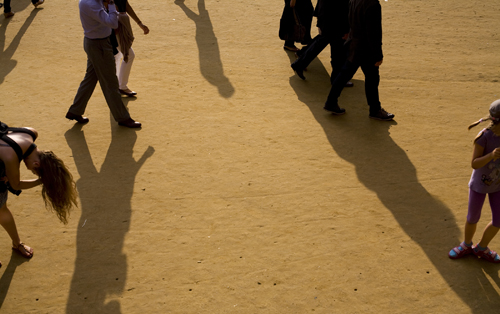 The Chinese dragon comes last, a red and yellow flutter with a black, toothy grimace, tipping back and forth between the crowds gathered along the street. My son steps off the curb to see then darts back to wrap his arms around my knee. I point to the legs in black propelling the dragon forward, “See? Just people, just pretend.” We get a full glimpse of a man as the head lolls near. My son’s grip relaxes. A few feet away now, the dragon leers, a wash of color pulsing with the bat-bat-bat of drums. We watch its back rise and fall as it rounds a bend then disappears.
The Chinese dragon comes last, a red and yellow flutter with a black, toothy grimace, tipping back and forth between the crowds gathered along the street. My son steps off the curb to see then darts back to wrap his arms around my knee. I point to the legs in black propelling the dragon forward, “See? Just people, just pretend.” We get a full glimpse of a man as the head lolls near. My son’s grip relaxes. A few feet away now, the dragon leers, a wash of color pulsing with the bat-bat-bat of drums. We watch its back rise and fall as it rounds a bend then disappears.
In seconds, the street fills with men in gray uniforms hustling to pick up trash. Behind them, street sweepers drive huge bristle brushes along each curb. It’s July but overcast, the sky threatening with the wooly gray of impending rain. We have a train to catch, but there’s a wall of people around us folding chairs and blankets, packing up food and drinks, tugging children from their shoulders for the trek home. We’ve only moved a few steps when I see a man in gray reach over a crowd-control barrier toward a little girl. His dark eyes shine. His smile is warm.
In a fluffy dress I won’t be able to name the color of an hour later, she looks like a flower, a gold-trimmed rose. Maybe three years old. How sweet, I think. It occurs to me to try with my husband for a third; he’s always wanted girls. She reaches with both arms. The man leans down to lift her up.
Behind us, a woman screams, maybe a name or a word. It’s piercing and full of warning. I duck, clench my son’s hand, swing around to find the threat or injury. Short and small, the woman pushes people aside to get through. When I see her next, the little girl is in her arms.
“Oh my God,” she gasps, looking around about the time the rest of us do. The uniformed men are retreating from us like an impenetrable fog.
The woman’s mouth opens to speak and fails several times before she finally admonishes the child, “What were you thinking? What were you doing?” The girl stares back, wide-eyed, frozen.
Someone finally asks, “You didn’t know him?”
“No,” she snaps, but the voice that follows trembles and cracks. “I’ve never seen that man before.” She’s crushing the girl to her.
If she had prolonged one good-bye, dropped a chair, lingered over a date to meet for coffee, told one more story, her daughter’s face would be everywhere. I’d know her name. I’d know the color of her dress.
My son puts his arms out to be held. I pick him up, hold him close, fingers wound together under him. Head on my shoulder, he’s already falling asleep.
The crowd finally moves, spilling down alleys and side streets, talking and laughing, instructing children, blowing kazoos and whistles, pulling coolers on rollers, debating whether to stop somewhere for lunch or go straight home.
On the main street, every cobble is stripped of debris. The air fills with the smell of stale beer and cotton candy as the street sweepers barrel past, engines droning as the warning lights blink on their tops and sides. Turning at the same time, their single lights on top come together to make a pair of wild yellow eyes, unfocused and spinning in the rain.
—
Darlene Pagán teaches at Pacific University in Oregon and writes in the wee hours of the morning before her young sons wake up. She recently published a chapbook of poems, Blue Ghosts, with Finishing Line Press. Her poems are forthcoming in, or have most recently appeared in, journals such as Calyx, Hayden’s Ferry Review, Hiram Poetry Review, and Hawaii Pacific Review. Her essays have appeared in Memoir (and) and Literal Latte. She loves to bike, hike, dig at the beach, enjoy the rain in fall and carnival rides in summer.
Photo by Annie Agnone
